How the Aegean Sea Got Its Name – The Myth of King Aegeus

The Aegean Sea
If you look hard enough, there’s a story behind everything, especially when it relates to all things Greek.
The ancient Greeks were admirable story-tellers.
The purpose of ancient Greek myths was to teach or to entertain, through, stories, passed down by word of mouth, before they were written but most importantly, the ancient myths were a means of worship to their gods.
My knowledge of Greek Mythology comes from school and of course, through reading, however, mostly it comes from my children’s school homework (and I could write a whole blog post on that!).
One myth I remember well, also my daughter’s favourite, of which she reminded me just the other day, is the story of how The Aegean Sea Sea, located between mainland Greece and Turkey came by its name.
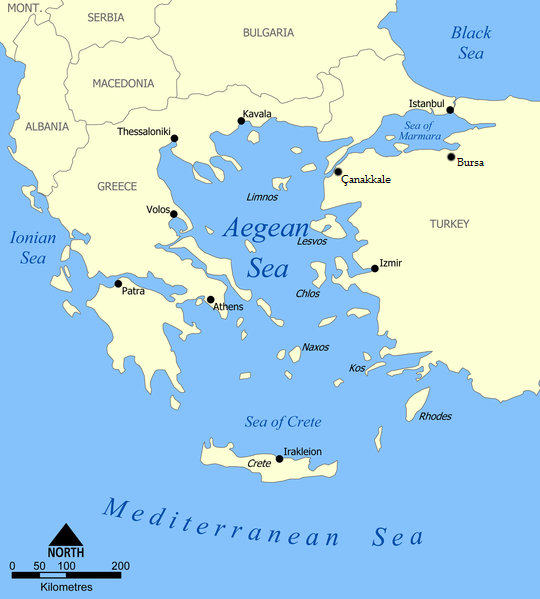
Aegean Sea, Greece. Map Created by Norman Einstein, January 12, 2006.
As with most stories passed down through word of mouth, people add bits here and forget bits there, resulting in copious variations on a theme.
Here is the wonderful tale of how the Aegean Sea got its name, the version which my daughter and I learnt together, many years ago.
king Aegeus of Athens
Long, long ago, in the city of ancient Athens, there lived a king, Aegeus, who, after failing to produce a son and heir, with his first two wives, Meta and Chalciope, decided to consult the goddess Themis, one of the the oracles of Delphi, to see what he was doing wrong.
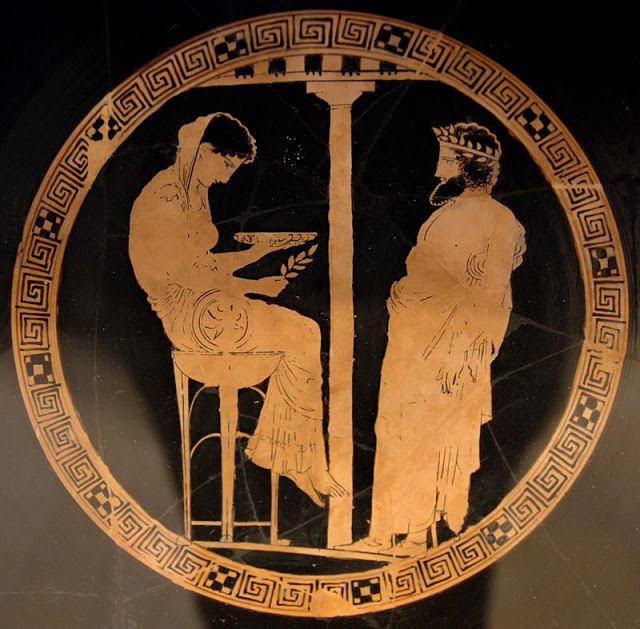
Aegeus consults with Themis, Oracle of Delphi. Circa 440–430 B.C.
The advice received from Themis was rather confusing to Aegeus:
“Do not loosen the bulging mouth of the wineskin until you have reached the height of Athens, lest you die of grief.”
Pondering upon this conundrum, while on his way home to Athens, Aegeus dropped in on his old pal King Pittheus of Troezen (a small town in the northeastern Peloponnese).
“Pittheus is a wise old scoundrel” thought Aegeus, “he’ll work out the meaning of this riddle”.
Indeed Pittheus knew exactly what the cryptic prophecy from Themis was all about, and quickly proceeded to get Aegeus exceedingly drunk, and then, with a twinkle in his old eye, introduced Aegeus to his daughter, Aethra.
A Greek party, wine flowing plentifully, the king of Athens and a nubile young girl, the inevitable happened:
Aethra discovered she was pregnant!
Theseus
Before the baby was born, Aegeus had to leave for Athens, where he was to marry his third wife, Medea, an enchantress with the gift of second sight.
Before he left, Aegeus placed his sandals and his sword under a rock, and instructed Aethra, that when the child came of age, he was to retrieve the sandals and the sword and return them to Aegeus in Athens.
Time passed, Aethra gave birth to a baby boy, who she named Theseus.
As instructed by Aegeus, on the boy’s coming of age, Aethra took him to the rock, presented her son with the sandals and sword of Aegeus, and sent Theseus on his way to Athens.
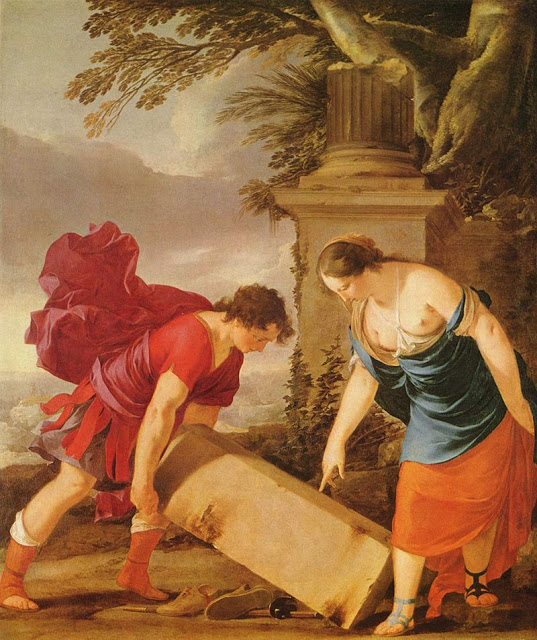
As instructed by Aegeus, on the boy’s coming of age, Aethra took him to the rock, presented her son with the sandals and sword of Aegeus, and sent Theseus on his way to Athens.
Medea:
Wicked stepmother
Now, if you remember, Aegus had returned from Troezen to Athens, in order to marry Medea, which he did, and the marriage had produced a son, Medus.
Medea, who had her contacts on the grapevine, learnt that Theseus, son of Aegeus and Aethra, legitimate heir to the throne of Athens, was on his way to throw a spanner in her plans to have Medus, her son, crowned king.
Medea put her devious mind in gear and reported to her husband, Aegeus, that local gossip had it; an impostor was on his way to Athens, about to declare himself to be Theseus, rightful heir to the throne of Athens.
“Never fear husband” Medea said to Aegeus, “I know exactly how to foil this young whippersnapper, leave things to me”
Upon his arrival in Athens, Theseus found an invitation awaiting him; he was requested to attend a banquet at the palace of King Aegeus, as this was exactly where he was heading, Theseus happily accepted the invite.
Meanwhile, back at the palace, Medea informed Aegeus of her evil plan; they would poison Theseus and be rid of him once and for all.
.jpeg)
Medea, Theseus and Aegeus, William Russell Flint (1910)
Aegeus, a kind man at heart, wasn’t too keen on killing a fellow human without out knowing all the ins and outs of his crime but on the other hand, could he bear the wrath of Medea if he didn’t play along with her dastardly doings?
Against his better judgment, Aegeus agreed to poison Theseus but at the banquet, just as Medea was handing a cup of poisoned wine to the impostor, he recognized his sandals and sword, this was no impostor, this was his true son, Theseus!
.jpg)
Theseus Recognized by his Father. Hippolyte Flandrin (1832)
The trials and tribulations of Theseus
Aegeus embraced his son, and with no further ado, had Medea and her son, Medus, banished from the city of Athens, but what had Theseus unwittingly gotten himself into?
These were not peaceful times in Athens, Aegeus, and his brother, Minos, king of Crete, were engaged in ongoing sibling rivalry, and, to add insult to injury, Androgeus, son of king Minos of Crete, continuously won all events in the Panathenaic Games.
This made Androgeus the golden boy of Athens, much to the disgust of the Pallantidai, the fifty sons of Pallas, nobles of Athens, rivals of their uncle Aegeus and his son Theseus over the Athenian throne, who, green with jealousy and red with embarrassment, assassinated Androgeus, which, as you would expect, did not go down too well with Minos, who immediately attacked Athens.
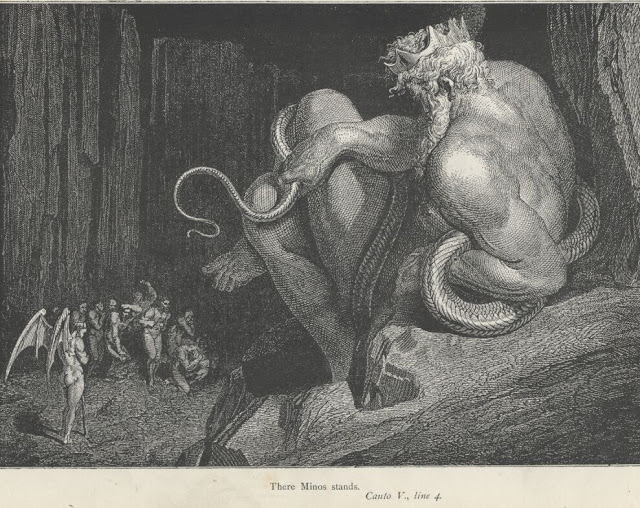
Gustave Doré’s illustration of King Minos for Dante Alighieri’s Inferno
Minos of Crete demanded his son’s assassins be handed over to him, and Athens would be spared, but, as Aegeus did not know the identity of the assassins, this, he could not do.
After much argy bargy, confrontations and negotiations, Minos finally agreed to peace between Athens and Crete on one condition.
The price Athens was to pay for peace with Crete, was that every nine years, Athens was to send seven male and seven female youths to Crete, who would then be sacrificed to the ferocious creature, with the head of a bull and body of a man, the Minotaur, which was imprisoned in a labyrinth (created by Daedalus of Icarus and Daedalus fame).
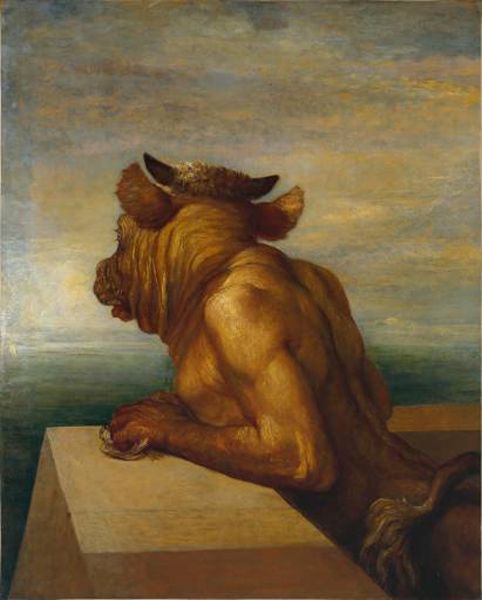
The Minotaur of Crete. George Frederick Watts
After the third time of shipping fourteen youths over to Crete, to be devoured by the dreadful Minotaur, Theseus had had enough, and decided to put an end to this barbaric carry on, he would go as one of the youths to be shipped out, and slay the Minotaur!
On hearing of Theseus’ heroic stand, Aegeus, understandably, feared for his son’s life.
To mollify his father’s fears, Theseus explained to him, that he would sail out with black sails, and, after slaying the Minotaur, to show that all was well, and that he was still alive, would make the return journey under white sails.
Theseus, Ariadne and the Minotaur of Crete
Theseus set sail for Crete, and, with his fears only slightly alleviated, Aegeus made for Cape Sounion, a good look out point, to wait anxiously for that first glimpse of, hopefully, white, homeward bound sails.

Temple of Poseidon, (God of the Sea), at Cape Sounion. South of Athens, Greece. Photo: National Geographic
On landing in Crete, Theseus met up with Ariadne, his cousin and daughter of king Minos and as in all great Greek myths, they fell in love.
To help Theseus with his daunting task, Ariadne gave him a ball of string, telling him to unravel it as he made his way through the labyrinth, and to follow it, after slaying the Minotaur, so as to find his way back.
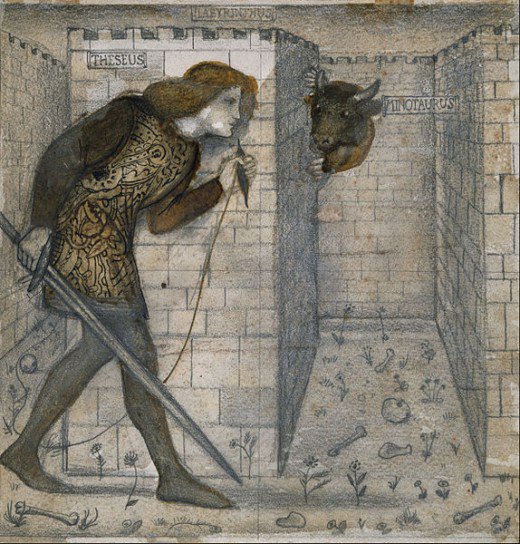
Theseus and the Minotaur in the Labyrinth. Edward Burne-Jones, 1861
Theseus killed the beast, followed the string, made it back to Ariadne, and the two of them made a run for it, back to Athens,stopping off at the island of Naxos on the way, where a great celebration was held in their honour.
Ariadne, not accustomed to flagons of Greek wine, fell asleep on the shore, and missed the boat to Athens (Some versions of the story say Theseus abandoned Ariadne purposely).
On discovering that Ariadne was not aboard the boat for Athens, Theseus, in his upset and panic, forgot to change the black sails for white ones.
The naming of the Aegean Sea
Back in Sounion, Aegeus, beside himself with worry, was devastated to spot his son’s returning ship, carried along by the winds which were filling its black sails.

King Aegeus awaits Theseus – Illustration Panaiotis Kruklidis
No, this could not be, the sails were meant to be white and,in a rush of emotion, believing his son to be dead, Aegeus threw himself off the cliffs and perished in the sea below.
And this, my friends, is the sad, but wonderful story of how the mistake of a son, and the death of a king, gave this magnificent, sparkling blue, Greek Sea, the name, Aegean.
Always listen to the oracle!

The Oracle at Delphi
If you recall, at the beginning of our story, King Aegeus had received advice from Themis, one of the priestesses at the Oracle at Delphi, which was rather confusing to Aegeus:
“Do not loosen the bulging mouth of the wineskin until you have reached the height of Athens, lest you die of grief.”
It all seems clear now, Themis was telling him:
“Aegeus, if you value your life, head straight back home to Athens, do not call in on your old pal King Pittheus, he will ply you with wine, which will lead to your downfall”.
The oracle never lies!



